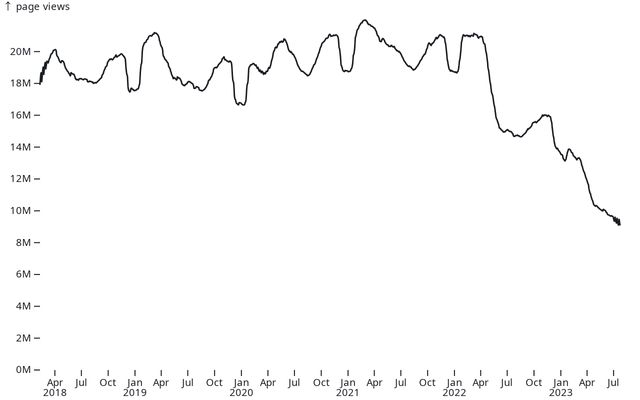Over the past one and a half years, Stack Overflow has lost around 50% of its traffic. This decline is similarly reflected in site usage, with approximately a 50% decrease in the number of questions and answers, as well as the number of votes these posts receive.
The charts below show the usage represented by a moving average of 49 days.
What happened?
There is a lot of Stack Overflow hate in this thread. I never had a bad experience. I was always on there yelling at noobs, telling them to Google it, and linking to irrelevant questions. It was just wholesome fun that briefly dulled my crippling insecurities
So you never had a bad experience, just were actively causing bad experiences for others?
I think you just fell for quite an obvious case of sarcasm.
Rather than cultivate a friendly and open community, they decided to be hostile and closed. I am not surprised by this at all, but I am surprised with how long the decline has taken. I have a number of bad/silly experiences on stackoverflow that have never been replicated on any other platform.
All questions have been asked and all answers have been given
Amazing how much hate SO receives here. As knowledge base it’s working super good. And yes, a lot of questions have been answered already. And also yes, just like any other online community there’s bad apples which you have to live with unfortunately.
Idolizing ChatGPT as a viable replacementis laughable, because it has no knowledge, no understanding, of what it says. It’s just repeating what it “learned” and connected. Ask about something new and it will simply lie, which is arguably worse than an unfriendly answer in my opinion.
The advice on stack overflow is trash because “that question has been answered already” yeah, it was answered 10 years ago on a completely different version. That answer is depreciated.
Not to mention the amount of convoluted answers that get voted to the top and then someone with two upvotes at the bottom meekly giving the answer that you actually needed.
It’s like that librarian from the New York public library who determined whether or not children’s books would even get published.
She gave “good night moon” a bad score and it fell out of popularity for 30 years after the author died.
I don’t think that’s entirely fair. Typically answers are getting upvoted when they work for someone. So the top answer worked for more people than the other answers. Now there can be more than one solution to a problem but neither the people who try to answer the question, nor the people who vote on the answers, can possibly know which of them works specifically for you.
ChatGPT will just as well give you a technically correct, but for you wrong, answer. And only after some refinement give the answer you need. Not that different than reading all the answers and picking the one which works for you.
Of course older answers are going to have more uovotes if they technically work. That doesn’t mean it’s the best answer. It’s possible that someone would like to make a new, better, answer and is unable to because of SA restrictions on posting.
The kinds of people who post on SA regularly aren’t going to be the people with the best answers.
On top of that SA gives badges for uovoting and it’s possible other benefits I’m unaware of.
As we saw with reddit, uovotes systems can be inherently flawed, we have no way of knowing if that uovote is genuine.
Explains the huge swaths of bad advice shared on Reddit though. It’s shared confidently and with a smile. Positive vibes only!
What’s “Reddit”?
(I removed all my advice from there when it was considered “violent content” and “sexualization of minors”… go find your 3d printing, programming, system management and chemistry tips elsewhere, I did it anyway)
I hear you. I firmly believe that comparing the behavior of GPT with that of certain individuals on SO is like comparing apples to oranges though.
GPT is a machine, and unlike human users on SO, it doesn’t harbor any intent to be exclusive or dismissive. The beauty of GPT lies in its willingness to learn and engage in constructive conversations. If it provides incorrect information, it is always open to being questioned and will readily explain its reasoning, allowing users to learn from the exchange.
In stark contrast, some users on SO seem to have a condescending attitude towards learners and are quick to shut them down, making it a challenging environment for those seeking genuine help. I’m sure that these individuals don’t represent the entire SO community, but I have yet to have a positive encounter there.
While GPT will make errors, it does so unintentionally, and the motivation behind its responses is to be helpful, rather than asserting superiority. Its non-judgmental approach creates a more welcoming and productive atmosphere for those seeking knowledge.
The difference between GPT and certain SO users lies in their intent and behavior. GPT strives to be inclusive and helpful, always ready to educate and engage in a constructive manner. In contrast, some users on SO can be dismissive and unsupportive, creating an unfavorable environment for learners. Addressing this distinction is vital to fostering a more positive and nurturing learning experience for everyone involved.
In my opinion this is what makes SO ineffective and is largely why it’s traffic had dropped even before chat GPT became publicly available.
Edit: I did use GPT to remove vitriol from and shorten my post. I’m trying to be nicer.
I think I see a core issue highlighted in your comment that seems like a common theme in this comment section.
At least from where I’m sitting, SO is not and has never been a place for learning, as in a substitute for novices learning by reading a book or documentation. In my 12-year experience with it, I’ve always seen it as a place for professionals and semi-professionals of various experience and overlap sharing answers typically not found in the manual, which speeds up the pace of investigations and work by filling eachother’s gaps. Not a place where people with plenty of time on their hands and/or knack for teaching go to teach novices. Of course there are those people there too but that’s been rare occurrence in my experience. And so if a person expects to get a nice lesson instead of a terse answer from someone with 5 minutes or less, those expectations will be perpetually broken. For me that terse answer is enough more often than not and its accuracy is infinitely more important than the attitude used to say it.
I expect a terse answer. I also am a professional. My experience with SO users is that they do not behave professionally. There’s not much more to it.
I don’t want to compare the behavior, only the quality of the answers. An unintentional error of ChatGPT is still an error, even when it’s delivered with a smile. I absolutely agree that the behavior of some SO users is detrimental and pushes people away.
I can also see ChatGPT (or whatever) as a solution to that - both as moderator and as source of solutions. If it knows the solution it can answer immediately (plus reference where it got it from), if it doesn’t know the solution it could moderate the human answers (plus learn from them).
That’s fair. You don’t have to compare the behavior. There’s plenty of that in the thread already.
Understandably, it has become an increasingly hostile or apatic environment over the years. If one checks questions from 10 years ago or so, one generally sees people eager to help one another.
Now they often expect you to have searched through possibly thousands of questions before you ask one, and immediately accuse you if you missed some – which is unfair, because a non-expert can often miss the connection between two questions phrased slightly differently.
On top of that, some of those questions and their answers are years old, so one wonders if their answers still apply. Often they don’t. But again it feels like you’re expected to know whether they still apply, as if you were an expert.
Of course it isn’t all like that, there are still kind and helpful people there. It’s just a statistical trend.
Possibly the site should implement an archival policy, where questions and answers are deleted or archived after a couple of years or so.
The worst is when you actually read all that questions and clearly stated how they don’t apply and that you already tried them and a mod is still closing your question as a duplicate.
human nature remembers negative experiences much better than positive, so it only takes like 5% assholes before it feels like everyone is toxic.
True that! and a change from 2% to 5% may feel much larger than that.
One aspect that I’ve always been unsure about, with Stack Overflow, and even more with sibling sites like Physics Stack Exchange or Cross Validated (stats and probability), is the voting system. In the physics and stats sites, for example, not rarely I saw answers that were accepted and upvoted but actually wrong. The point is that users can end up voting for something that looks right or useful, even if it isn’t (probably less the case when it comes to programming?).
Now an obvious reply to this comment is “And how do you know they were wrong, and non-accepted ones right?”. That’s an excellent question – and that’s exactly the point.
In the end the judge about what’s correct is only you and your own logical reasoning. In my opinion this kind of sites should get rid of the voting or acceptance system, and simply list the answers, with useful comments and counter-comments under each. When it comes to questions about science and maths, truth is not determined by majority votes or by authorities, but by sound logic and experiment. That’s the very basis from which science started. As Galileo put it:
But in the natural sciences, whose conclusions are true and necessary and have nothing to do with human will, one must take care not to place oneself in the defense of error; for here a thousand Demostheneses and a thousand Aristotles would be left in the lurch by every mediocre wit who happened to hit upon the truth for himself.
For example, at some point in history there was probably only one human being on earth who thought “the notion of simultaneity is circular”. And at that time point that human being was right, while the majority who thought otherwise were wrong. Our current education system and sites like those reinforce the anti-scientific view that students should study and memorize what “experts” says, and that majorities dictate what’s logically correct or not. As Gibson said (1964): “Do we, in our schools and colleges, foster the spirit of inquiry, of skepticism, of adventurous thinking, of acquiring experience and reflecting on it? Or do we place a premium on docility, giving major recognition to the ability of the student to return verbatim in examinations that which he has been fed?”
Alright sorry for the rant and tangent! I feel strongly about this situation.
Gibson was correct about much of our education system and Galileo was certainly right about the consequences of overvaluing mediocre wit that merely happened to well-timed. what neither of them had to content with, however, was the internet and how social media can combine the inability to reason critically and mediocre wit with crippling insecurities and anti-social personalities to what should be predictable results.
a least Gibson understood that a technocratic future didn’t imply that people’s lives would necessarily improve.
I have to agree with this cause I have run into not a couple but many in recent years where when a proper answer is given, the accepted one despite being flawed or not recommended(Python 2->3 changes for example) anymore, it’s still the highest voted one. And proper answer is in 3rd or 4th place. And it’s where the old r/science shine cause you can properly ask some really specific domain question there and a qualified scientist might just pop up and answer you in detail. ( not that they can’t be wrong, just highly unlikely in current understanding of those topics. )
Science is based on peer review, which means that a scientific opinion will be accepted only if it can convince a sufficient number of other scientists. This is not too different from using an explicit voting system to rank answers.
All scientists accept the possibility that what they currently believe to be true may one day be considered false. Science does not pretend to describe only eternal truths. So it’s not a problem if the most popular answer today becomes the least popular answer in the future, or vice versa.
Peer review, as the name says, is review, not “acceptance”. At least in principle, its goal is to help you check whether the logic behind your analysis is sound and your experiments have no flaws. That’s why one can find articles with completely antithetical results or theses, both peer-reviewed (and I’m not speaking of purchased pseudo peer-review). Unfortunately it has also become a misused political or business tool, that’s for sure – see “impact factors”, “h-indexes”, and similar bulls**t.
Peer review is a general principle that goes beyond the formalities of journal publication.
Even if you never submit your work to a peer-reviewed journal, your scientific claims will be judged by a community of scientific peers. If your work is not accepted by your scientific peers, then you are not contributing to scientific knowledge.
For example, most homeopathic claims are never submitted to journals. They are nevertheless judged by the scientific community, and are not persuasive enough to be accepted as scientific knowledge.
You’re simplifying the situation and dynamics of science too much.
If you submit or share a work that contains a logical or experimental error – it says “2+2=5” somewhere – then yes, your work is not accepted, it’s wrong, and you should discard it too.
But many works have no (visible) logical flaws and present hypotheses within current experimental errors. They explore or propose, or start from, alternative theses. They may be pursued and considered by a minority, even a very small one, while the majority pursues something else. But this doesn’t make them “rejected”. In fact, theories followed by minorities periodically have breakthroughs and suddenly win the majority. This is a vital part of scientific progress. Except in the “2+2=5” case, it’s a matter of majority/minority, but that does emphatically not mean acceptance/rejection.
On top of that, the relationship between “truth” and “majority” is even more fascinatingly complex. Let me give you an example.
Probably (this is just statistics from personal experience) the vast majority of physicists would tell you that “energy is conserved”. A physicist specialized in general relativity, however, would point out that there’s a difference between a conserved quantity (somewhat like a fluid) and a balanced quantity. And energy strictly speaking is balanced, not conserved. This fact, however, creates no tension: if you have a simple conversation – 30 min or a couple hours – with a physicist who stated that “energy is conserved”, and you explain the precise difference, show the equations, examine references together etc, that physicist will understand the clarification and simply agree; no biggie. In situations where that physicist works, this results in little practical difference (but obviously there are situations where the difference is important.)
A guided tour through general relativity (see this discussion by Baez as a starting point, for example) will also convince a physicist who still insisted that energy is conserved even after the balance vs conservation difference was clarified. With energy, either “conservation” makes no sense, or if we want to force a sense, then it’s false. (I myself have been on both sides of this dialogue.)
This shows a paradoxical situation: the majority may state something that’s actually not true – but the majority itself would simply agree with this, if given the chance! This paradoxical discrepancy arises especially today owing to specialization and too little or too slow osmosis among the different specialities, plus excessive simplification in postgraduate education (they present approximate facts as exact). Large groups maintain some statements as facts simply because the more correct point of view is too slow to spread through their community. The energy claim is one example, there are others (thermodynamics and quantum theory have plenty). I think every physicist working in a specialized field is aware about a couple of such majority-vs-truth discrepancies. And this teaches humbleness, openness to reviewing one’s beliefs, and reliance on logic, not “majorities”.
Edit: a beautiful book by O’Connor & Weatherall, The Misinformation Age: How False Beliefs Spread, discusses this phenomenon and models of this phenomenon.
It couldn’t happen to a more deserving group of smug, self-satisfied shitheads.
As alluded to by comments here already, a long coming death.
Will probably go down as a marker of the darker side of tech culture, which, not coincidentally (?) manifested at time when the field was most confused as to what constitutes its actual discipline and whether it was an engineering field at all.
Half of a fuck-ton is still a lot. If they scale down their operational costs they can still run a very comfortable business for a long while on these kinds of numbers.
I think the point is not their viability as a business but their relevance in the industry.












